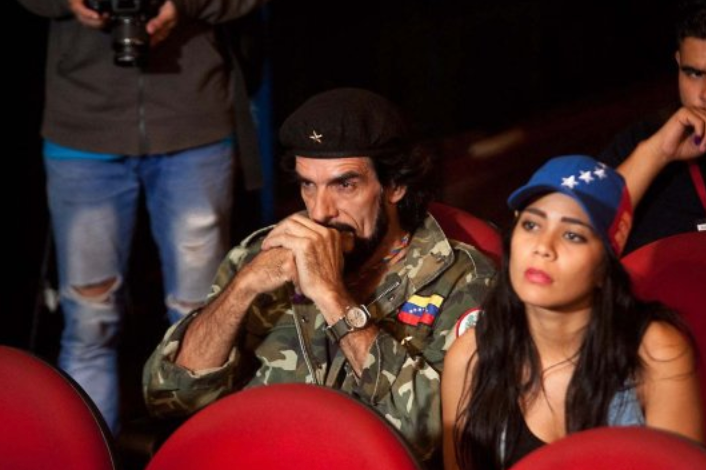Humberto López is a well-known figure in Caracas, especially around downtown. He drives around in a military jeep vehicle dressed up as the famous Cuban revolutionary Che Guevara, always with a big cigar in hand. He strikes a peculiar figure that gets greetings and expressions of support wherever he goes. He doesn’t respond to his given name anymore. Everyone calls him Che.
Humberto is a member of the so-called collectives of the downtown Catedral parish of Caracas, which are among the most radical groups that pledge allegiance to the legacy of the late Hugo Chávez. Humberto has no problem admitting that he led the attacks against the pro-opposition television channel RCTV in 2001, and that on several occasions he has had to “face the opposition with violence, but always in favor of the people.”
But the most surprising thing about this local version of Che Guevara is not what he did during the Chávez government, but what he does and says today, during the Nicolás Maduro government. “I’m not going to sweeten shit with perfume,” he emphatically declares, quoting Venezuelan protest singer Alí Primera. “Maduro is no son of Chávez, he doesn’t speak the truth to the people. He has to explain why, in the middle of an economic war, he has decided to convene this meeting (the Non-Aligned Movement) for example.”
The Caracas Che is not the only one that thinks this way. The phrase “I am Chavista, not Madurista” has been gaining ground as a result of the economic crisis and high inflation, which have hit working people particularly hard. What is new about this phenomenon is that support for the government among the collectives does not seem unconditional.
While Hugo Chávez was alive the collectives, despite their differences, functioned as a compact block in support of Chávez in all areas. However, after his death, divisions among the collectives, and criticisms of the Maduro government have become more profound and pose a threat to its stability.
The collectives’ perceptions of errors in the current government has led not just to grumbling among themselves, but public protests. Recently the collectives of Petare, the most densely populated barrio of Caracas, decided to close one of the main highways of the city to protest the detention of the leader of the National Revolutionary Secretariat, an umbrella organization of more than 100 collectives.
Where the collectives do still act on behalf of the government, they are resented. part of the population in the barrios think that the collectives have lost their fundamental purpose and have turned into a form of government police inside the barrios. In a recent event, members of the Alirio Díaz Carbonell collective in Catia murdered a man allegedly linked to a looting incident. The murder incensed the community, which protested and called for justice against the perpetrators.
Catia was the cornerstone of Hugo Chávez’s support but voted for the opposition in the December 2015 legislative elections.
“The collectives are no longer a political force, they are acting for money. They are simply defending the government because that’s where they get their money from,” I was told by a neighbor from 23 de Enero an old working class housing project in Catia, who preferred to remain anonymous. “Now it’s not about defending he revolution, it’s about this constant source of income (teta) they have,” he said.
Another neighbor from Catia, Julio Hernández said “They (the collectives) come and stand here with loudspeakers and threaten people. They say that escualidos (opposition supporters) will not receive CLAP bags (government food distribution). That they won’t be able to get identity documents; they behave like a mafia. For me it would be better if they disappeared, for this shit (vaina) to come to an end.”
The Venezuelan Che Guevara thinks the deterioration has to do with the fact that Maduro’s government has left the path set by Chávez. “This is exactly what Che (the original historical figure) used to say: ‘the path is long and full of difficulties, but this is often because we travel too fast and lose sight of the masses, other times it is because we go too slow and we feel the breath of those closing in on our heels,’ we are already feeling the breath of the opposition on our backs since they won the National Assembly, and why did we lose the Assembly? Well, because Maduro is not listening to the people, he is not enamoring them.”
López says he is not afraid to say what he says because he has “revolutionary morals.” “We had a revolution here against a system that was very unequal and that was harmful to the people. If it becomes necessary to defend the people then we will have to do it all over again, because that is what a revolution is about, changing what is wrong for what is right.”
Translated by Hugo Pérez Hernáiz and Geoffrey Ramsey



